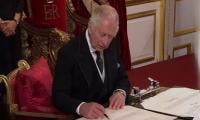ISLAMABAD: The three federating units Sindh , KP and Balochistan are most likely to give tough time to the Punjab and federal governments in the meeting of Council of Common Interests (CCI) scheduled on August 6 on the interpretation of Article 158 and 172 (3) of the Constitution with regard to the priority rights about the usage of minerals, oil and natural gas.
The CCI to be attended by all provinces with Prime Minister Imran Khan in the chair will analyse the interpretation of Article 158 and 172 (3) of the Constitution with regard to identifying the priority rights of using the oil and natural gas.
The top sources say that Sindh, Balochistan and KP will not budge from their rights of prior rights in using the oil and gas resources.
The Article 158 clearly says that the province in which a well head of the national gas is situated shall have precedence over other parts of Pakistan in meeting the requirement from the well head, subject to the commitments and obligations as on the commencing day.
However, the federal government says that at the time of the framing of the Constitution of Pakistan 1973, one of the issues, which was debated was the use of natural gas in the backdrop of major gas production by the province of Balochistan. The federal government infers that primary use of natural gas was meant for domestic purposes such as cooking and space heating.
And during the Musharraf regime, the then government wanted to keep the capital of Pakistan—Islamabad and defense installation away from Article 158 in terms of using the oil and natural gas but provinces did not agree with the then government. However, oil and gas producing provinces Sindh, KP and Balochistan say that Article 158 does not mention the gas to be first used by domestic sector (for cooking and space heating), rather it clearly says that the province wherein oil and natural gas is produced has the first right to cater to its energy needs (domestic, commercial and industrial) and if the gas gets spared after the said province utilizes all its needs, it can be forwarded to the province, which is facing deficit of the gas.
The Petroleum Division has built its argument to be pitched in the CCI meeting on August 6, 2020 saying that by looking at demand projections, Sindh, Khyber Pakhtunkhwa are seen going into shortage even if they use all the gas produced in the provinces. So, unless a fair mechanism is developed to induct imported gas in all provinces, all provinces will start seeing severe gas crisis in the next few years. And in the larger national interest, the Petroleum Division in relation to implementation of Article 158 has submitted its recommendations for consideration and decision by the CCI. The recommendations of the Petroleum Division say that first priority for usage of natural gas is for domestic consumers in all provinces.
And independent natural gas allocation should be for consumers which include federal capital, ex-Fata regions, AJK and Gilgit Baltistan followed by use of gas by defence and strategic installations.
The Petroleum Division also asked for priority in usage of natural gas for power plants followed by fertilizer plants in all provinces.
About usage of imported gases, Petroleum Division says that the imported gas LNG or gas to be imported through IP gas line or TAPI gas line should be used without any restriction by or any consumer in all provinces and the federal government would allocate gas based on the above priorities in consultation with the provinces.
The federal government is of the considered view that the people of Pakistan are the ultimate owners and beneficiaries of the natural resources and the federal government and provincial governments have the fiduciary duty to act solely in the interest of beneficial owners of resources. Under this very principle, both the federal government and the provincial governments have to work for the management of the resources in the interests of people of Pakistan and not to indulge in any effort, which seeks to disintegrate the relationship of the federation and its federating units. The role of federation is to create harmony amongst its federating units; therefore, any available resource within the federating units needs to be seen from the perspective of a natural resource and the provision of basic necessities including natural gas needs to be ensured without any discrimination to the domestic sector within the province in which a well head of natural gas is situated as well as across the country.
The office of Attorney General for Pakistan (AGP) says that i) The CCI shall exercise exclusive authority to regulate policies in relation to the mineral oil and natural gas i.e. to make rules and regulations to regulate the policies formulated by it and approve model Petroleum Concession Agreement/Production Sharing Agreement to give binding effect to the incentives and packages of the policies approved by it.
Office of Attorney General also says Majlis-e-Shoora, Parliament shall have the exclusive powers to legislate in the matters of mineral oil and natural gas in line with the policies approved by the council.
It also says that the federal government shall promulgate the rules under the law after being formulated by the council and shall exercise exclusive authority in the matters of mineral oil and natural gas under the rules in consultation with the respective provincial representative within DGPC. AGP office says, “The federal government shall execute Pakistan Petroleum Concession Agreements and for Production Sharing Agreements as the case may be in line with the approved model agreement in the name of President of Pakistan in exercise of its executive authority under Article 173 of the Constitution.”
According to AGP, the federal government shall give effect to the policies formulated by the Council and incase the deviation from the policy is deemed expedient by the government, approval from the Council shall be sought before exercising executive authority. It also says that the existing permits, licences and leases and their extensions and renewals and the terms and conditions of the agreements in relation to exploration, prospecting, development and production of mineral oil and natural gas in Pakistan granted and executed prior to April 19, 2010 shall remain preserved and protected and the meaningful consultations with representative of the province with GDPC shall be deemed to be the consultation with the provinces and the provinces cannot agitate or any matter at any subsequent stage.
In an interview with a private TV channel on Friday, the senator said, “Making independent members senators is a...
All the lawyers requested that the court seek decisions from the AG regarding the release of these 20 individuals
Rehman emphasized that restoration and adherence to Constitution would encompass democracy within political parties,...
Court after hearing the matter for more than three hours, telecasted live, sought replies from the federal government...
Khyber Pakhtunkhwa Chief Minister Ali Amin Gandapur. —Radio PakistanISLAMABAD. All the witnesses have been...
Former prime minister, MNA Raja Pervez Ashraf speaking on the occasion of World Press Freedom Day at the National...







